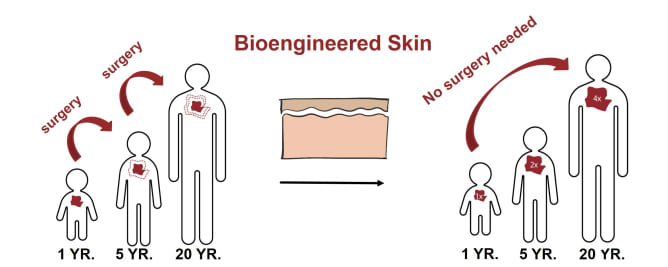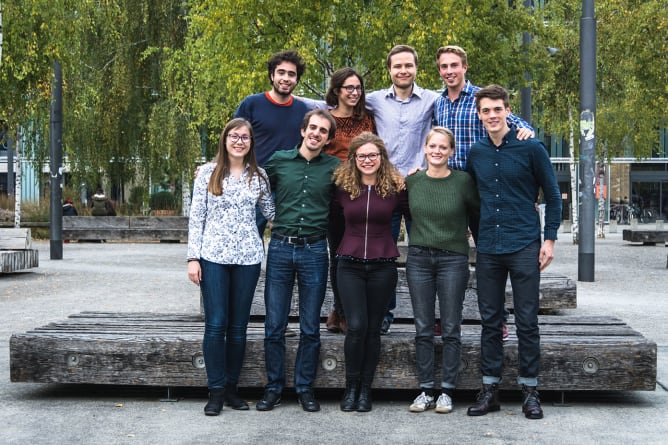Largest Organ
The skin is the largest organ of the human body. It protects the whole body and performs various vital functions. Its damage can lead to a protracted healing process. A severe skin burn, skin loss or chronic skin disease is often associated with multiple surgeries and defacement. Patients suffer physiological and psychological.
Children with severe burns suffer for a long time
Today severe burns are treated using the patient’s own skin transplanted to the spot that needs a transplant. However, the downside of this method is that this procedure results in a non-elastic transplanted skin. Thus, children need a new transplantation every 2-3 years until they are full-grown. Every operation means new physical, psychological and financial burden for the patient.
Scientists at the Tissue Biology Research Unit (TBRU) at the Children Hospital in Zurich developed a new type of bioengineered skin made out of patient’s cells. This new type of skin has the advantage of growing after the transplantation. Several transplantations on children led to promising results. However, this treatment isn’t ready yet for everyone.

Automatisation allows the same treatment for everyone
The goal of our project is to develop a machine which allows us reproducing a standardized skin for later transplantation and research.
What is the advantage of the automatisation? Traditional methods require expensive lab infrastructure, highly qualified employees, highly specialized materials and are time consuming. Thus, only a handful of children were given this new type of skin yet. We have a dream that one day every severe burnt child around the world has access to be cured by bioengineered skin.
Developing a robust machine allows us producing skin as many times as needed and always ensuring the same quality. Automatisation gives us the unique possibility of packaging the knowledge at the research site of Zurich into a single and easily operated machine which then can be used everywhere around the globe. This is the only possibility to bring this new kind of treatment to all children with severe burns.
How does our SkinReactor work?
First a stamp sized biopsy is taken from the patient which afterwards gets split into cells and brought into our machine. Our device automatically proliferates these cells up to a number enough to create a skin patch. The surgeon uses this patch for a transplant. There are already bioreactors but none of them is made for skin cell proliferation nor easy personalized research.

Future
In a few years all steps to a fully automatically produce a skin patch will be available to the public. Why are we in a first step working on the middle part of the production line? Cell proliferation is the main process. Without cell proliferation there is no bioengineered skin patch. This step is the longest, technical the most complex and therefore we focus on this one.
We can’t make it without your help!
The first steps on a long path are set; the first transplantations were a success. After 15 years of research at the children hospital in Zurich the ETH student project SkinReactor sets another milestone of bringing this treatment to the public. The main core in skin production is cell proliferation and its automatisation sets the fundation for futher and faster research. To bring theory to reality we only got little research funding. That is why we need private sponsors. With your help we can produce the SkinReactor! We can make it!
The crew
Arion Schuler, Séverine Somlo, Björn Joos, Lukas Bircher
Seraina Domenig, Robin Stähli, Caroline Zalud, Nora Strebel, Rafael Zuber
